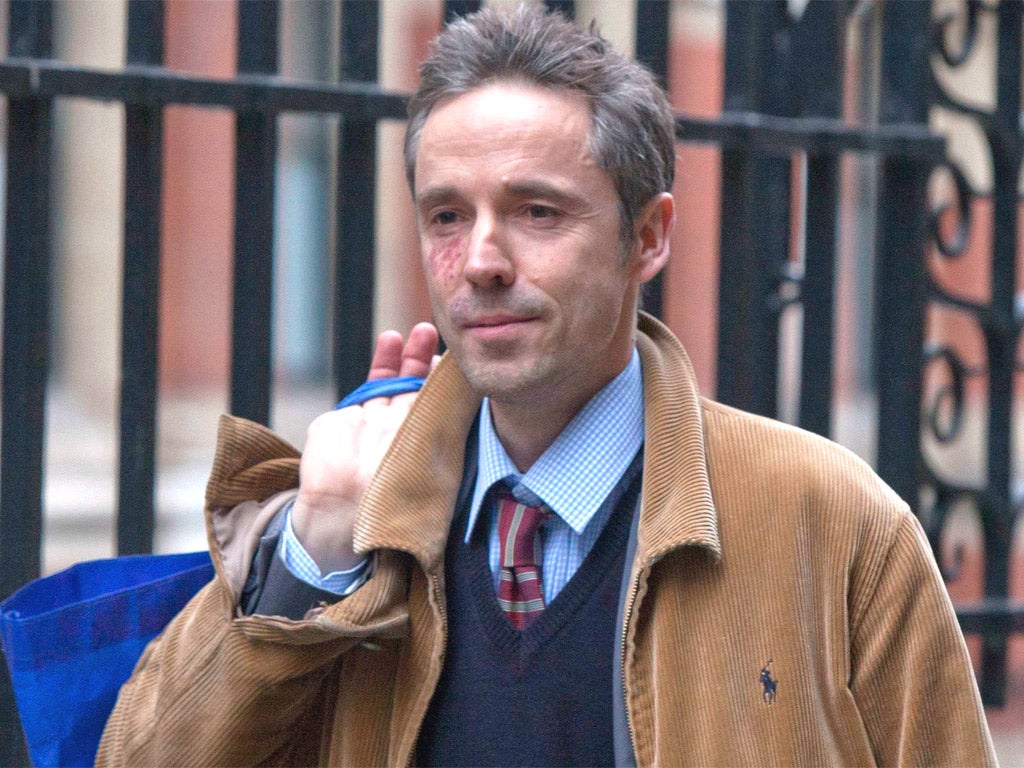Coulson brought phone hacking to News of the World, says ex-reporter
Journalist says Brooks also knew of widespread practice and reveals Beckham was a target

Two former editors of the News of the World knew the full extent of phone hacking at the tabloid but "threw reporters to the wolves" to distance themselves from the illegal practice, the Leveson Inquiry heard yesterday.
In some of the most startling and controversial testimony heard since the judicial review into press ethics began, Paul McMullan, the NOTW's former deputy features editor, said Andy Coulson had "brought the practice [of illegal voicemail interception] wholesale with him when he was appointed deputy editor".
In no-holds-barred evidence, which challenged the legal right to privacy and claimed dictators in China and Iran would be "laughing" at the inquiry, he said the "fairly common" practice of phone hacking was "done for the editors, Rebekah Brooks and Coulson". He branded them "scum" for "trying to drop me and my colleagues in it", but also claimed that hacking was "widespread" across Fleet Street and insisted the NOTW was "the least bad of the offenders".
Asked directly if Ms Brooks and Mr Coulson, currently under police bail, knew voicemails were being intercepted, Mr McMullan replied: "Yes."
In a challenge to years of serial denials of knowledge of phone hacking by Tom Crone, News International's former legal manager, McMullan said he was required to tape every interview he conducted. "It was Tom Crone's job to make sure anyone trying to sue was headed off at the pass because 'here's the video' or 'here's the tape'," he said.
Mr McMullan worked for the NOTW for seven years, in roles including war correspondent and as one half of a double act with the infamous "Fake Sheikh" Mazher Mahmood, and was responsible for some of the most high-profile stories the top-selling newspaper delivered to its readers. He admitted to once trying to hack into the phone of the former England football captain, David Beckham, but was caught out when Mr Beckham picked up the call. He told the inquiry: "I didn't hack his phone – in that instance."
It took a personal warning from Lord Leveson on self-incrimination to halt him in full flow. He later told the inquiry, during a passage on the activities of Glenn Mulcaire, the private investigator commissioned to hack phones by the Murdoch-owned tabloid: "It was a shame you said what you did earlier, I would have quite happily spoke more about it."
Mr McMullan said a succession of UK prime ministers had "cosied up" to the Murdoch empire and accused David Cameron of effectively turning a blind eye to the criminal practices that had gone on under Mr Coulson's regime. He said the Prime Minister had ended up with "Murdoch-lite – James [Rupert's son] and Rebekah Brooks" and said Mr Cameron had been "moulded by the arch-criminal, Rebekah Brooks, the criminal-in-chief".
He added that he was congratulated by Piers Morgan for having "pinched" a picture from the woman who took John Major's virginity.
He defended practices of intrusion that have dominated the inquiry to date, claiming in one of his most controversial passages of exposition that "the hacking of Milly Dowler's phone was no bad thing for a well-meaning journalist to do". Mr McMullan did not condone the actual hacking, but claimed the police force looking for Milly were full of "Inspector Clouseaus". He added: "We were doing our best to find the little girl, the police were utterly incompetent."
He also said the British people did not need Max Mosley to tell it what it should put in its newspapers, and said the NOTW's five million readers were the ultimate "judge and jury" of what was put on its pages. "Privacy is the space bad people need to do bad things in," he insisted.
Hacked off: The day journalists had their say
Journalists wanting to publish private information about individuals should have to justify what they are writing before a public interest advisory body, the Leveson Inquiry heard.
Nick Davies, the Guardian reporter credited with revealing the extent of phone hacking by the News of the World, said such a body would help distinguish between what was published in the public interest and what was merely of interest to the public. He said the issue of what should and should not be published arose during coverage of the US war logs from Afghanistan obtained by WikiLeaks, when it became obvious that publishing the names of people who gave information to the coalition forces could get them killed.
Davies said the private detective Glenn Mulcaire was the "facilitator" for the hacking of murdered teenager Milly Dowler's mobile but that NOTW journalists deleted some of her phone messages. Also speaking yesterday, the former Daily Star journalist Richard Peppiatt claimed he received threats and may have had his phone hacked after he quit the paper in protest at what he claimed was its anti-Muslim propaganda. He claimed editorial decisions at the paper were "dictated more from the accounts and advertising departments than the newsroom floor" but added that the paper "did not really use" private detectives, adding: "I don't think that was some sort of ethical decision as much as a financial one."
Lewis Smith
Subscribe to Independent Premium to bookmark this article
Want to bookmark your favourite articles and stories to read or reference later? Start your Independent Premium subscription today.
